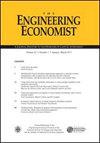工程经济是当今和未来工程项目中充满活力和相关的课程
IF 1.2
4区 经济学
Q4 BUSINESS
引用次数: 0
摘要
工程经济学已被广大工科学生学习多年,但其在工程教育中的地位却经常被误解。按理说,工程经济课程是许多工科学生唯一会选修的与金融相关的课程,因此应该受到高度重视,但有证据表明,该学科正在被边缘化。虽然减少课程学分的压力和工程基础考试的变化可能在这方面发挥了作用,但也许工程经济还没有充分发展到满足学生的需求或当代工作场所的现实。如何确保工程经济学作为工程教育的重要组成部分发挥其潜力?可能很少有明确的答案,但我们相信工程经济应该转向一个以严格的课程为特征的未来,这些课程以工程设计原则和风险和不确定性的应用为基础。这是我们多年来在西密歇根大学教授工程经济学的目标。这篇论文的目的是传达一个策略的基本要素,这个策略帮助课程成为几个工程项目中充满活力的组成部分。本文章由计算机程序翻译,如有差异,请以英文原文为准。
Engineering economy as a vibrant and relevant course in the engineering programs of today and tomorrow
Abstract Engineering economy has been studied by the majority of engineering students for many years, yet its place in engineering education is often misunderstood. Logic suggests that the engineering economy course would be highly valued since it is the only course many engineering students will take related to financial matters, but instead there is evidence that the subject is being marginalized. While pressures to reduce program credit hours and changes to the Fundamentals of Engineering exam may play a role in this, perhaps engineering economy has not sufficiently evolved to meet the needs of students or the realities of the contemporary workplace. What can be done to ensure that engineering economy fulfills its potential as an important part of engineering education? There may be few clear-cut answers, but we believe that engineering economy should shift toward a future characterized by rigorous coursework grounded in engineering design principles and applications of risk and uncertainty. This has been our goal in teaching engineering economy at Western Michigan University for many years. The purpose of this paper is to communicate the essential elements of a strategy that has helped to make the course a vibrant component of several engineering programs.
求助全文
通过发布文献求助,成功后即可免费获取论文全文。
去求助
来源期刊

Engineering Economist
ENGINEERING, INDUSTRIAL-OPERATIONS RESEARCH & MANAGEMENT SCIENCE
CiteScore
2.00
自引率
0.00%
发文量
14
审稿时长
>12 weeks
期刊介绍:
The Engineering Economist is a refereed journal published jointly by the Engineering Economy Division of the American Society of Engineering Education (ASEE) and the Institute of Industrial and Systems Engineers (IISE). The journal publishes articles, case studies, surveys, and book and software reviews that represent original research, current practice, and teaching involving problems of capital investment.
The journal seeks submissions in a number of areas, including, but not limited to: capital investment analysis, financial risk management, cost estimation and accounting, cost of capital, design economics, economic decision analysis, engineering economy education, research and development, and the analysis of public policy when it is relevant to the economic investment decisions made by engineers and technology managers.
 求助内容:
求助内容: 应助结果提醒方式:
应助结果提醒方式:


